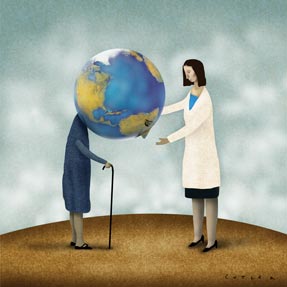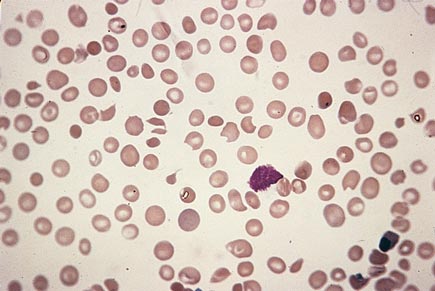ACP's new EVP/CEO talks burnout prevention, future focus
Darilyn Moyer, MD, FACP, ACP's first female EVP/CEO, addresses her plans for the organization, the evolution of health care, and how her experience will guide her efforts.
Darilyn Moyer, MD, FACP, is known for her work as a physician educator. But this month, the attending is extending her leadership role to the national level, succeeding Steven Weinberger, MD, MACP, as ACP's Executive Vice President and Chief Executive Officer.

Dr. Moyer most recently served as assistant dean for graduate medical education and director of the internal medicine residency program at the Lewis Katz School of Medicine at Temple University in Philadelphia. Initially selected this spring as ACP's President-elect, she was chosen after a national search to become the College's first female EVP/CEO, based on the recommendation of a search committee appointed by ACP's Board of Regents. Dr. Moyer spoke with ACP Internist about her plans for ACP, the evolution of health care, and how her experience will guide her efforts.
Q: How would you describe your involvement with ACP?
A: I've been a member for pretty much my entire professional life. I got very involved around 2005 with the Pennsylvania group and [then got involved] with the Governor's Advisory Council and the Health and Public Policy Committee. I became the Governor for Southeastern Pennsylvania from 2010 to 2014, was elected Chair of the Board of Governors during my third year of governorship, and became a member of the Board of Regents. I've been on several [ACP] committees, and as the Health and Public Policy Chair last year, I really got a glimpse into all the great work that is coming out of [ACP's] Washington, D.C., shop on the medical practice front.
Q: What are your clinical plans as you enter this new role?
A: I'm going to be an adjunct professor of medicine [at Temple] and continue to see patients with the internal medicine residents at Temple University Hospital in their outpatient-based practice in North Philadelphia. I've been on the front lines of care delivery for a very long time at an institution that has a large underserved patient population, so I thought [it was important] to be able to continue to care for patients, like how Steve [Weinberger] was continuing to work with the pulmonary fellows over at Penn. I'm infectious diseases-trained and I've done some inpatient attending, but it's been important for me as a medicine program director to continue to practice internal medicine.
Q: How would you describe your practice style and clinical interests?
A: I believe you can learn something from every patient encounter and every encounter with a member of your health care team. In turn, you can take the opportunity to educate, as well. My real passion has been as a medical educator, helping to train the next generation of physicians to be able to adapt and be resilient as we see health care transformation take hold. But at the same time, through the thousands of years of medicine and changes in medicine, what we need to remember to get back to is that primacy of the patient-physician relationship: connecting with the patient and looking into their eyes, not incessantly into the eyes of a computer screen.
Q: How will your background in physician education influence how you lead ACP in its future initiatives?
A: One of the important tenets is that we've got to cultivate our important farm team. ACP has been excellent at leading by example, and the College can help the profession in terms of developing these über leadership skills that are going to help physicians at all stages of their training. Most physician careers are going to be 35, 40, 45 years long, the bulk of which is going to be spent in practice. I really see a role for the College to help lead the charge in terms of teaching those skills of adaptability, resiliency, and leadership—how to be a leader at the local level, regardless of what your practice looks like or what your health care system looks like.
Q: How will you address physician burnout, one of your areas of interest?
A: The wave of professional dissatisfaction that we're seeing is a complex, multifactorial issue. I think that we need to address many different areas: instilling skills of resiliency and adaptability in the medical educational world and helping physicians to see opportunities in the challenges and to be able to lead the charge of health care transformation in a sensible, patient-centric way. We really need to get back to the basics with those skills.
At the same time, we need to address the myriad redundancies and other challenges that physicians are confronted with. There are some wonderful things about EHRs, but there are also a lot of challenges with EHRs. … We need to really be able to work with all the stakeholders here, our patients, regulatory agencies, the insurance companies, the health systems, to find a common middle ground.
There are also issues with quality metrics and how we're measuring performance. Medicine is, at its heart, an evidence-based profession. We practice based on the best evidence that we have at the time for that individual patient to have a shared decision-making process. We need the same thing to happen around the metrics and the quality indicators that we're measuring our physicians on. A lot of people have said it really needs to be the “quadruple aim,” and the fourth leg of the stool is professional satisfaction. We need to be measuring that, as well, and to be working with our physicians to find the right formula for the quality metrics. We need as much as possible for these to be data-driven and to be informed by evidence and experience.
Q: Looking forward, what other issues can ACP members expect the College to focus on?
A: We've done many position papers recently: the escalating cost of prescription drugs, the graduate medical education enterprise, the public health epidemic of gun violence, telemedicine, care of lesbian, gay, bisexual, and transgender individuals. I think the other hot topics are Maintenance of Certification and, in terms of guidelines, performance measurement and clinical synthesis: taking this data we're bombarded with and helping to synthesize [it to make it] practical and usable at the point of care. I think the College will continue to harmonize these efforts so we can work smarter, not harder, and continue to move those initiatives forward.
Q: As health care continues to evolve, what are you most excited about?
A: I literally lived through the HIV epidemic. I was a first-year medical student [in 1981], was a medical resident from ‘85 to ‘88, and then an infectious diseases fellow in the early ‘90s. I have really gotten to live through the transformation of people going from dying from their HIV to getting sick with their HIV and living long enough to develop diseases of aging. We've been able, with the help of a lot of the new technologies for diagnosis and treatments, to really elevate care to the next levels. I have a fourth-year medical student as my older daughter, and I'm very excited for the potential for her career in medicine and all of the good that she and all the younger physicians will do for their patients.
I am really excited for how far we've come in medicine but, at the same time, how its important values have not been changed. For all this technological explosion in health care, a lot of it simply comes down to a basic good history and physical and being able to connect and talk to your patients and see the other factors that play into their health care, such as social and behavioral determinants of health.




